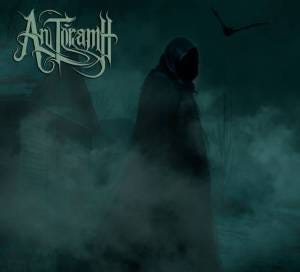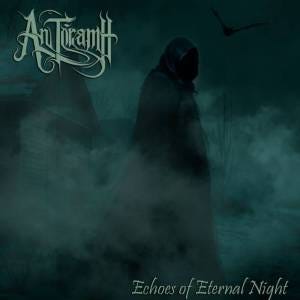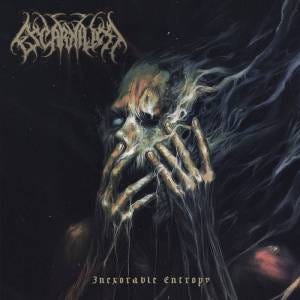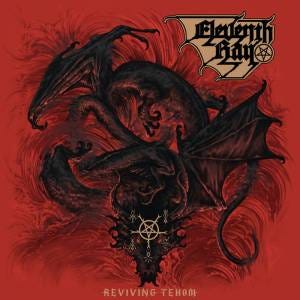Beats and yelling shorts, 2nd July 25
An Tóramh: Echoes of Eternal Night
Out 9th May on Black Lion Records
Mixing the despondency of latter day Esoteric with a lo-fi sensibility grants this album a greater degree of dignity than the overworked emotional catharsis of much modern funeral doom. The usual hesitant, droning chords are punctuated by almost constant harmonic decoration, with the lead guitar adopting threnodic, lyrical lines that could easily have been written for violin. This offsets the guttural vocals buried in the mix and which might has well have been omitted for all the depth they add. Whilst An Tóramh are not immune to succumbing to sentimental monotony, each track offers a pocket of divergent thematic material, reaching for depressive or epic moods to supplement the slog of dignified sorrow. The chasmic atmosphere is enhanced by the simplicity of the reverb heavy drums, plodding along in metronomic pulses with little in the way of accents or rolls. This grants the music a degree of torturous struggle which is to its credit. A refreshing if patchy reset for funeral doom.
Prophetic Suffering: Rivalry of Thyself
Out 9th May on Sentient Ruin
Essentially a death metal version of Hate Forest. Pleasing waves of pulsing noise enshrine the listener in a warm ambience of flowing, one dimensional riffs, near constant blast-beats, guttural vocals, and limited additional harmonies as each piece progresses. Whilst the momentum is more stilted than black metal (staccato interventions abound), the music progresses in intuitive, linear units seamlessly linked together by the glue of excess noise. Whilst war metal and goregrind are identifiable as submerged peripheral entities, the active agents across this album are death metal’s impulse toward anomie and the homogenous ambient tendencies of black metal. The result, much like Hate Forest, is an aesthetic tour de force with no end of subtle delights to offer. But the overarching gestalt or purpose of the music remains somewhat elusive. Prophetic Suffering ultimately fail to elevate this material into something beyond the sum of its parts in order to communicate a binding thesis.
Escarnium: Inexorable Entropy
Out 9th May on Everlasting Spew Records
A classic example of death metal’s abandonment of riffs in favour of bespoke aesthetic presentations, in this case caverncore. A dark, blasting, cacophony of mulch supplemented by jangly guitar arpeggios because the music needs to be populated by something. If one is after a purely atmospheric experience told in the garb of death metal, there is little to be garnered from this album that one couldn’t get from the latest Cruciamentum. But whereas ‘Obsidian Refractions’ attempted to tease out a riff philosophy, there is no such impetus on display here. The result is a series of random lurches between various gradations of intensity, light dissonance, and scant generic melodicism when it apparently occurs to Escarnium that absolutely nothing has been happening over the course of a four minute track.
Eleventh Ray: Reviving Tehom
Out 16th May on Dark Descent Records
Eccentric Greek entity attempts to reacquaint the plodding melodic regalness of early Rotting Christ and Varathron with a dirtier 80s influence. Whilst one can appreciate the effort, the resulting album feels like it’s being pulled apart at the centre. Melodramatic ornamentation and gestures toward mysticism look contrived, and only serve to distract from what is an otherwise competent if understated tour of old school blackened heavy metal. Reading this in the wider context of Greek black metal, a series of overworked symphonics and forced epic melodicism attempting to recapture a former glory long since dissipated, ‘Reviving Tehom’ looks like a move to get in on the action by leveraging a distinctly lo-fi interpretation of the same. In other words, Greek black metal is held hostage by a past that will never come back. In learning the wrong lessons from its canonical works – that flamboyance was the creative engine room – newer artists, and indeed older artists still trying to make hay out of their legacy, appear incapable of achieving anything more than trite facsimiles. There are riffs here, genuine melodic flair, and unexpected moments of panache. But the joy to be garnered from these elements is somewhat buried beneath the capitulation to needless theatricality.
Veia: Tuchulcha / Il ritorno di Tuchulcha (Promo MMXXV)
Out 16th May on Prehistoric Sounds
Brief EP sketching out a blueprint for black metal founded on early Gorgoroth, Ulver, and Enslaved, injecting a darker, meditative undercurrent into the otherwise soaring melodic material. Simple lead refrains operate with a clear intentionality and forward motion, taking the listener on a journey through evolving phrases of lyrical cadences. Active bass cuts through the mix offering interesting rhythmic sequences as a neat accompaniment to the fluidity of the tremolo guitar lines. Drums switch between simple back-beats and blast-beats, the latter of which adopts a jazz like shuffle that serves to neatly unsettle the self-assured flow of the guitar lines. The mix is austere, modest, with just enough depth to lend the hypnotic pacing of the music a degree of gravitas and sense of occasion. Despite the brief runtime – ten minutes all in – enough information is conveyed here to bring to life a welcome resurrection of Infernus’s unmatched melodic flair alongside melancholy, age, and latent darkness.
Unmerciful: Devouring Darkness
Out 23rd May on Willowtip Records
Generic brutal death metal still achieves a semblance of pleasing violence through its general disregard for technical flair. Not that the album is sloppy by any measure, machine like precision is maintained throughout. Rather that, much like Brodequin’s latest effort, the jagged edges of techdeath are shaved off for the sake of a purer experience of direct brutality. Where Brodequin crafted waves of galloping momentum supplemented by Gregorian sobriety however, Unmerciful go for a more stilted, mid-paced affair, blast-beat segments serving almost as incidental accents to the otherwise multifaceted rhythmic plod of phrasing. This creates space for additional meandering and lead material within the riffs. An opportunity that is largely passed up by Unmerciful, instead choosing to rest on the laurels of blunt, atonal bludgeoning throughout, rarely deviating from their riff signature or supplementary curiosities. The result, whilst satisfying, brings us little more than the feeling of a job well done. Bombast and adventure will have to be found elsewhere.










